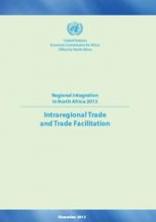Regional Integration in North Africa 2013: Intraregional Trade and Trade Facilitation

Regional integration is a key aspect of the economic development of the countries of North Africa. Trade is an important element of this. It is clear that trade within the region is one of the weakest in Africa. The Arab Maghreb Union has not quite managed to create the strong momentum for promoting trade, called for by its member countries.
Trade facilitation measures, such as the development of infrastructures, improved border management and removal of non-tariff barriers can contribute to promoting trade within North Africa. Implementing these measures requires the political will to introduce reforms to remove obstacles and support economic operators.
Trade facilitation is also on the agenda of the Doha Development Round and has been taken up in international negotiations, with a call to the industrialized countries to provide support to the developing countries, particularly the least developed ones. The recent outcomes of the World Trade Organization Ministerial Conference, held in Bali, Indonesia, testify to this.
The purpose of this report is to present the status of the regional integration process in North Africa and provide an analysis on the subject of trade facilitation and its contribution to genuine integration in the subregion. The report is divided into five chapters: the first gives an overview of major regional cooperation events in 2013,which contributed to regional integration; the second briefly analyses the dynamics of trade within North Africa, highlighting the role of manufactured goods; the third chapter presents the role played by trade facilitation in fostering trade; and the fourth chapter is an analysis of progress made by the countries of the subregion in facilitating trade, based on indices and indicators drawn up by various international organizations. It also includes recent work by the Economic Commission for Africa to create a regional integration index.